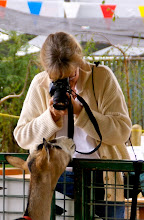I'm afraid of heights. I've often joked that my primate ancestor was the first one out of the trees -- the minute her feet hit the ground, she wiped her sweaty brow with her hand and said, "Whew, I'm never going back up there again!" My mother was also afraid of heights. When I was little and we would go skiing, mom was always nervous on the chairlift, not simply because she was afraid that she would fall off but also because she feared that she would deal with her fear of falling off by jumping off first, just to stop the stress.
I mention this because I'm reading a wonderful book by Jared Diamond: Collapse: How Societies Choose to Fail or Succeed. Diamond outlines the circumstances leading to past societal collapses (Easter Island, the Anasazi, the Vikings on Greenland, etc.) and then identifies the factors that contributed to the poor group decision making that caused the collapses. The factors he identified are: (1) failing to anticipate the problem before it arrives, (2) failing to see the problem when it arrives, (3) failing to even try to solve the problem once it is perceived, and (4) trying to solve the problem but not succeeding.
I'm particularly interested in the third factor: seeing the problem but not even trying to solve it. Why would a society see a problem that is likely to destroy it and do nothing? Diamond proffers two reasons: the self-interest of those who expect to profit from societal destruction (i.e. selfishness) and the paralysis of those who worry that acting would contradict some deeply-held value (i.e. wooden-headedness). To these two factors, I would add a third: the fear of failure and the associated stress of waiting for outcomes. This is akin to my mother's contention that that a preemptive jump off the ski lift might be a good way to alleviate her fear of falling..
Climate change, global poverty, religious hatred, and environmental destruction are daunting challenges. I hope fear of failure doesn't stop us -- both as a society and as individuals -- from taking one step, then two steps, a hundred steps, a thousand steps to solve these problems.
What can an individual do? Lots. If you have money, give it. If you have power, use it. If you're a consumer, consume wisely. If you have a mouth, a pen, a computer keyboard, a billboard, or a bull-horn, make your views known. If you have a yard, a deck, or a porch, grow at least some of your own food. If you eat food, buy local and preserve some of it. Start with whichever of these things come easy to you and ease into the things that come harder. Repeat, repeat, repeat, repeat. Then repeat, repeat, repeat, repeat. As Winston Churchill said, "Never, never, never, never give up."
And remember, there is no such thing as false hope.
Today's front yard critter count:
Raccoons: 1 of the teenagers (a little female)
Deer: 3


